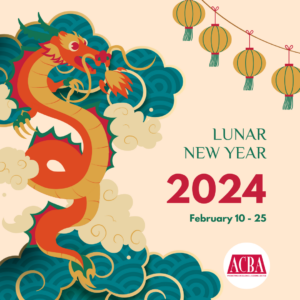 Lunar New Year is in full swing, with individuals around the world celebrating the arrival of the new lunar calendar. Every year, the 15 day celebration begins on the second new moon after the winter solstice. In 2024, the celebration started on Saturday, Feb. 10. and marks the year of the dragon. For attorneys practicing in multicultural communities or those with international clientele, understanding the legal implications and significance of Lunar New Year can be essential for fostering strong client relationships and navigating cultural sensitivities.
Lunar New Year is in full swing, with individuals around the world celebrating the arrival of the new lunar calendar. Every year, the 15 day celebration begins on the second new moon after the winter solstice. In 2024, the celebration started on Saturday, Feb. 10. and marks the year of the dragon. For attorneys practicing in multicultural communities or those with international clientele, understanding the legal implications and significance of Lunar New Year can be essential for fostering strong client relationships and navigating cultural sensitivities.
Cultural Significance: Lunar New Year, also known as Chinese New Year or Spring Festival, marks the beginning of the lunar calendar and is celebrated by numerous East Asian communities, including Chinese, Korean, Vietnamese, and others. The festival is deeply rooted in tradition and is a time for family gatherings, feasting, and honoring ancestors. It typically involves rituals such as cleaning one’s home to sweep away bad luck, offering prayers for prosperity and good fortune, and exchanging red envelopes containing money as a symbol of blessings and well wishes.
Legal Considerations:
- Employment Law: Employers with diverse workforces may need to accommodate employees who observe Lunar New Year by allowing them to take time off to celebrate with their families. Understanding relevant employment laws regarding religious or cultural observances is crucial to ensure compliance and promote inclusivity in the workplace.
- Contractual Obligations: For attorneys involved in international business transactions, it’s essential to be mindful of Lunar New Year holidays when drafting contracts or setting deadlines. Many businesses in East Asian countries shut down during the holiday period, which could affect project timelines and delivery schedules.
- Intellectual Property Protection: Lunar New Year often sees the release of special edition products and promotions by companies looking to capitalize on the festive spirit. Attorneys specializing in intellectual property law may need to advise clients on trademark protection and enforcement strategies to prevent unauthorized use of their brands or designs.
- Consumer Rights and Advertising: Companies running Lunar New Year marketing campaigns must ensure compliance with consumer protection laws and advertising regulations. Misleading advertising or false claims could lead to legal repercussions, not to mention the damage to your reputation.
- Immigration Law: Lunar New Year may prompt individuals to travel abroad to visit family or participate in cultural festivities. Attorneys practicing immigration law should be aware of any visa or travel restrictions that may impact clients planning to travel during this period.
Cultural Competence and Relationship Building: Understanding and respecting cultural traditions like Lunar New Year can strengthen relationships between you and your clients, particularly in multicultural communities or when working with international clients. Taking the time to acknowledge and celebrate important cultural events demonstrates sensitivity and fosters trust and rapport.
Lunar New Year is a vibrant and culturally significant celebration observed by millions around the world. For attorneys, recognizing the legal implications and cultural significance of this festival is essential for effectively serving diverse clients and navigating cross-cultural interactions. By embracing cultural competence and understanding the legal considerations associated with Lunar New Year, you can better support your clients and foster inclusive legal practices.
